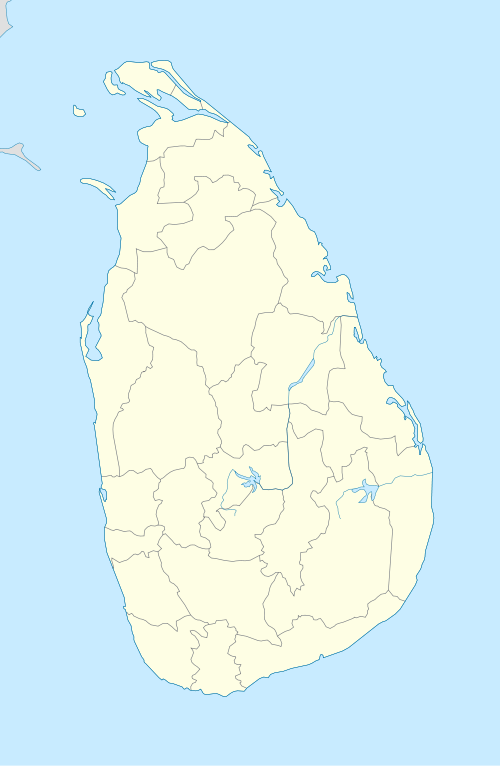Mawanella
| Mawanella මාවනැල්ල மாவனெல்ல | |
|---|---|
| Town | |
 Mawanella | |
| Coordinates: 7°15′12″N 80°26′47″E / 7.25333°N 80.44639°E | |
| Country | Sri Lanka |
| Province | Sabaragamuwa Province |
| Time zone | Sri Lanka Standard Time Zone (UTC+5:30) |
| Postal Code | 71500[1] |
| Area code(s) | 035 |

Mawanella is a town which belongs to the Kegalle district in the Sabaragamuwa Province of Sri Lanka. It lies between Kegalle and Kadugannawa along the Colombo-Kandy road. The area consists of four administrative areas, namely Mawanella, Aranayake, Rambukkana and Hemmathagama.
People
There is a significant Moors or Muslims population in the town and mawanella areas. Most of the surrounding areas are mostly inhabited by sinhala and Muslim people. Farming is the way of living for majority of the people. The main source of food is from rice fields.
Products
The crops include rice, tea, rubber, pepper, cardamom, nutmeg, vegetables and various types spices. Mawanella is also famous for its traditional handicrafts, especially the pottery, brass-ware and tobacco related industry. There are over 50 pottery shops in Annasigala area along the Colombo to Kandy road.
Incidents
In 2001 a riot took place in which a Sinhalese mob destroyed minority Muslim mosques and shops, and in which two people were killed and 55 injured.
Climate and Geology
Mawanella belongs to the Tropical Evergreen region of central Sri Lanka. The altitude of the area varies from 180m to 260 m above sea level. The average annual rainfall lies between 2500 and 4500 ml, and temperature of the region ranges between 22 degrees and 35 degrees Celsius. It receives most of the rain from Southwest Monsoon. The average wind speed has been measured to be approximately 7.2 km/hour and humidity in the range lies between 57% and 90%. The whole region is mountainous, but the most famous mountain is the Bathalegala or Bible Rock. Devanagala and Alagalla are another two mountains in the area. There is also a waterway called Maa Oya running very close to the town. The famous Mawanella Brick Bridge is built to cross the Maa Oya by colonial British rulers. A modern concrete bridge is in operation since 2005, parallel to the old Brick bridge.
Government/Religious Education
There are 3 educational divisions -Aranayake, Mawanella and Rambukana under Mawanella Educational Zone. There are 22,019 students and 54 schools in Mawanella, 16,517 students and 43 schools in Rambukkana and 12,964 students and 48 schools in Aranayake division totaling 51,500 students and 145 schools. 19 of the 145 total schools are Muslim schools. The most prestigious schools in the area are Mayurapada Central College, Rivisanda Central College, Zahira College, and Baduriya Central College. Buddhist Sunday schools a.k.a. "Daham Pasal", Islam schools such as Ahadiya or Madrasah and other religious schools provide a key element in religious education.
Private Education
Private educational institutes also play a major role in education. There are three international schools and large number of tuition institutes in the area. A large percentage of students seek these institutions, although the quality and standards of them remains questionable.
History
Mawanella is historically famous for Uthuwan Kande Soora Saradiel - a native who fought against British colonialism. He is known as the Robin Hood of Ceylon/ Sri Lanka as he looted the wealth from British officers and their local counterparts only to distribute it among the poor villagers. Deekirikewagela Saradiel was born in 1832 to his father Deekirikewage Adasi Appu - a bullocart driver and Molligoda Pichohami - a small coffee shop owner. The natives were under heavy economical and political pressure from unfair taxes under British rule and were rebelling against as best way they could. Saradiel was accompanied by fellow natives namely Mammale Marikkar, his sister, Abdul Cader, Nazarudeen, Samad etc.
In order to evade his arrest, Saradiel, decided not to remain in one single place permanently, for the sake of his own safety. While he was thus taking refuge in the homes of his friends, on March 17, 1864, a police team under the command of Head Constable Amath surrounded the house where Saradiel had been hiding, with the help of some of the residents of that area who had given them the tip-off, which resulted in the death on the spot of George Van Haught, a member of the police search party, due to a gunshot wound.
Also, while Muttusamy and Christian Appu, two of his other accomplices received grievous injuries and two other were slightly injured, while they were thus engaged in the fracas, Saradiel and Mammale Marikkar succeeded in escaping. Subsequently, the Police team including Police Sergeant Mahath and Police Constable Sabab, set out on March 21, 1864 to arrest Saradiel on the information given by the informant, one Sirimala. Based on this information, when the Police team surrounded the house belonging to Abdul Cader of Mawenelle searching for Saradiel, he attempted to shoot Sergeant Mahath.
But Sergeant Mahath outsmarted Saradiel by shooting him first, which resulted in Saradiel falling to the ground from the upstairs where he had been hiding. Due to a gunshot fired from the upstairs by Mammale Marikkar, a member of Saradiel’s gang, the Police Constable Saban was killed. This was the first time ever a police officer died on duty in Sri Lankan Police history and since, March 21 is commemorated as the Police Day. Saradiel was later executed by the British after a short trial.
References
External links
Coordinates: 7°15′12″N 80°26′48″E / 7.25345°N 80.44656°E